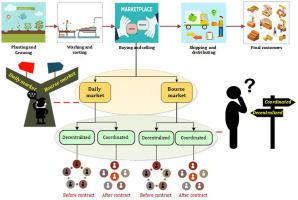当前位置:
X-MOL 学术
›
J. Clean. Prod.
›
论文详情
Our official English website, www.x-mol.net, welcomes your
feedback! (Note: you will need to create a separate account there.)
Optimizing decisions of fresh-product members in daily and bourse markets considering the quantity and quality deterioration: A waste-reduction approach
Journal of Cleaner Production ( IF 9.7 ) Pub Date : 2020-10-15 , DOI: 10.1016/j.jclepro.2020.124647 Hossein Mohammadi Dolat-Abadi
Journal of Cleaner Production ( IF 9.7 ) Pub Date : 2020-10-15 , DOI: 10.1016/j.jclepro.2020.124647 Hossein Mohammadi Dolat-Abadi

|
Unlike the great importance of differences between market types, the investigation of them is almost neglected in the fresh agricultural product supply chain (FAPSC). In this respect, this study aims to find proper answers for two questions, which FAPSC’s members face: 1) which market (daily or bourse) is economical for trading items? 2) How to adopt a strategy (decentralized or coordinated) to control the waste by FAPSC members while the members’ profit remains at a satisfactory level? Accordingly, the daily and bourse markets under a farmer-retailer Stackelberg game are studied in the first model. Afterward, a mathematical coordination model using a novel two-part tariff contract is developed between farmer and retailer in the market, which has been optimally determined in the first model. A data set from a real-world application is examined to validate the proposed models. The results demonstrate that the profit of both the farmer and retailer under the bourse market is more than the daily market. Moreover, the coordinated strategy increases the retailer’s profit as well as its order quantity, the farmer’s freshness-keeping investment as well as its profit, and the entire FAPSC’s profit compared to the decentralized strategy. The quantity of wasted products and the retail price under the coordinated strategy is lower than that under the decentralized strategy. Accordingly, related decision-makers are advised to make the two-part tariff contract under a coordinated strategy to reduce wasted products without posing a risk to their profit. The sensitivity analysis implies that by increasing the demand uncertainty and shipping cost, the coordinated strategy is more efficient in improving the FAPSC profit and controlling the quantity waste rather than the decentralized strategy.
中文翻译:

考虑到数量和质量恶化,优化每日和交易所市场中新鲜产品会员的决策:减少浪费的方法
与市场类型差异的重要性不同,在生鲜农产品供应链(FAPSC)中,对市场类型差异的调查几乎被忽视。在这方面,本研究旨在为FAPSC成员面临的两个问题找到正确的答案:1)哪个市场(每日或交易所)对于交易物品来说是经济的? 2)如何采取策略(分散或协调)来控制FAPSC成员的浪费,同时使成员的利润保持在令人满意的水平?因此,在第一个模型中研究了农民-零售商 Stackelberg 博弈下的每日市场和交易所市场。随后,在市场上的农民和零售商之间开发了一种使用新颖的两部分关税合同的数学协调模型,该模型在第一个模型中得到了优化确定。检查来自实际应用程序的数据集以验证所提出的模型。结果表明,交易所市场下农民和零售商的利润均高于日常市场。而且,与分散策略相比,协调策略增加了零售商的利润及其订单量、农民的保鲜投资及其利润、以及整个FAPSC的利润。协调策略下的废品数量和零售价格均低于分散策略。因此,建议相关决策者在协调策略下签订两部分关税合同,以在不对其利润构成风险的情况下减少废品。 敏感性分析表明,通过增加需求不确定性和运输成本,协调策略在提高 FAPSC 利润和控制数量浪费方面比分散策略更有效。
更新日期:2020-10-15
中文翻译:

考虑到数量和质量恶化,优化每日和交易所市场中新鲜产品会员的决策:减少浪费的方法
与市场类型差异的重要性不同,在生鲜农产品供应链(FAPSC)中,对市场类型差异的调查几乎被忽视。在这方面,本研究旨在为FAPSC成员面临的两个问题找到正确的答案:1)哪个市场(每日或交易所)对于交易物品来说是经济的? 2)如何采取策略(分散或协调)来控制FAPSC成员的浪费,同时使成员的利润保持在令人满意的水平?因此,在第一个模型中研究了农民-零售商 Stackelberg 博弈下的每日市场和交易所市场。随后,在市场上的农民和零售商之间开发了一种使用新颖的两部分关税合同的数学协调模型,该模型在第一个模型中得到了优化确定。检查来自实际应用程序的数据集以验证所提出的模型。结果表明,交易所市场下农民和零售商的利润均高于日常市场。而且,与分散策略相比,协调策略增加了零售商的利润及其订单量、农民的保鲜投资及其利润、以及整个FAPSC的利润。协调策略下的废品数量和零售价格均低于分散策略。因此,建议相关决策者在协调策略下签订两部分关税合同,以在不对其利润构成风险的情况下减少废品。 敏感性分析表明,通过增加需求不确定性和运输成本,协调策略在提高 FAPSC 利润和控制数量浪费方面比分散策略更有效。











































 京公网安备 11010802027423号
京公网安备 11010802027423号